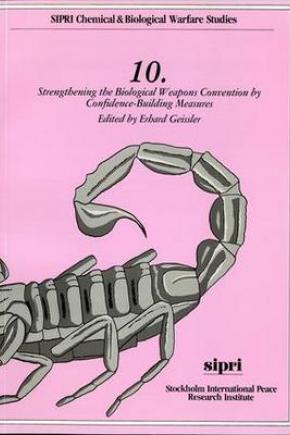Strengthening the Biological Weapons Convention by Confidence-building Measures
The participants of the Second Review Conference of the parties to the Biological Weapons Convention agreed on instituting voluntary confidence-building measures (CBMs) to strengthen the Convention. For this book SIPRI has gathered together experts in the fields of disarmament, epidemiology, molecular genetics, and virology. They evaluate the extent to which these CBMs contribute to preventing or reducing the occurrence of ambiguities, doubts, and suspicions which might be raised about compliance with the BW convention, and how CBMs contribute to improving international co-operation in the field of peaceful biological activities.
Contents
1. Introduction (S. J. Lundin)
2. Historical outline (Aida Luisa Levin)
3. New assessments of the potential value of BW and TW agents (Erhard Geissler)
4. Coverage of new technologies in the BWC (Erhard Geissler)
5. Agreed measures and proposals to strengthen the Convention (Erhard Geissler)
6. The first three rounds of information exchanges (Erhard Geissler)
7. Information on high-risk laboratories (Erhard Geissler and Gustaf Brunius)
8. Information on outbreaks of infectious diseases and intoxinations (John P. Woodall and Erhard Geissler)
9. Information on publication of results and promotion of contacts (Gustaf Brunius and Erhard Geissler)
10. Supplementary information (Erhard Geissler)
11. Discussion (Erhard Geissler, Gustaf Brunius, Aida Luisa Levin, S. J. Lundin, Herbert Marcovich and John P. Woodall)
12. Conclusions and recommendations (Erhard Geissler, Gustaf Brunius, Aida Luisa Levin, S. J. Lundin, Herbert Marcovich and John P. Woodall)
Annexe 1. The 1972 Biological Weapons Convention
Annexe 2. Final Declaration of the Second Review Conference of the BW Convention
Annexe 3. Report of the Ad Hoc Meeting of Scientific and Technical Experts
Annexe 4. Description of containment facilities
Annexe 5. Classification of infective microorganisms by risk group
Annexe 6. Proposal for an International Biological Monitoring Agency (Herbert Marcovich)
About the editor
Dr Erhard Geissler is Professor of Genetics and Head of the Peace Research Group, Central Institute of Molecular Biology, Academy of Sciences of the German Democratic Republic, Berlin. A biologist by training, he has done research in the fields of biophysics, microbial genetics and tumour virology. He has also published extensively on the subjects of biological weapons, the social impact of genetics and other biosciences and the responsibility of scientists, and has convened several symposia on these questions.
About the series editor
Dr S. J. Lundin, who assumed responsibility for the SIPRI CBW programme in 1987, is the Series Editor. He has served as a Director of Research of the Swedish National Defence Research Institute (FOA), and was for 16 years Scientific Adviser to the Swedish Delegation to the Conference on Disarmament in Geneva. He has been a consultant to the United Nations Centre for Disarmament, and has convened SIPRI and Pugwash symposia on matters relating to chemical weapons.
SIPRI Chemical & Biological Warfare Studies is a series of studies intended primarily for specialists in the field of CBW arms control and for people engaged in other areas of international relations or security affairs whose work could benefit from a deeper understanding of particular CBW matters.
This book can be ordered from all good bookshops and online booksellers or directly from OUP
OUP in the UK:
http://www.oup.com/uk/catalogue/?ci=9780198291398 (paperback)
OUP in the USA:
http://www.us.oup.com/us/catalog/general/?view=usa&ci=9780198291398 (paperback)

